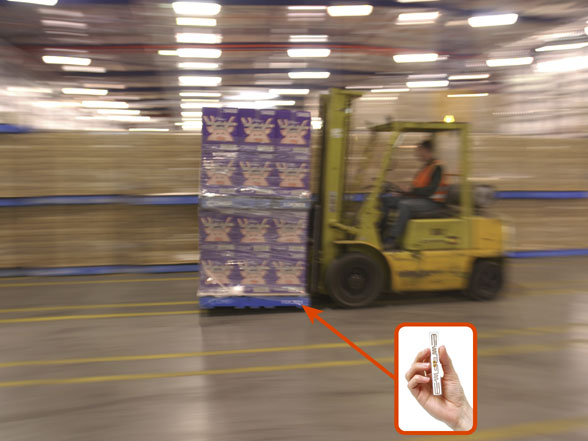 Forklift with pallets and a Gen2 tag. |
One-day interactive training sessions in electronic produce code (EPC) and radio frequency identification (RFID) will be held in November in three Australian cities.
The Australasian Production & Inventory Control Society (APICS) and GS1 Australia will run short courses in Brisbane, Melbourne and Sydney for the manufacturing, wholesale, distribution and services industries.
An APICS/GS1 statement said the courses provided a thorough introduction to RFID.
"By the end of the day, participants will have the tools necessary to consider their own RFID business case, including an understanding of RFID pros and cons, how to evaluate RFID technology vendors, launch a pilot project, and plan for successful RFID deployment," the statement said.
RFID systems would be compared with existing systems, such as bar codes. Case studies and return on investment would be examined. The courses would consider what to do when planning RFID implementation.
The APICS 3.5-hour morning sessions cost AUD400 for non-members. The optional afternoon GS1 EPC sessions cost AUD200 for non-members.
The statement said the afternoon sessions would explain EPC, standards, principles, Generation 2 EPC and how EPC supported "collaborative commerce and seamless supply chain management".
GS1 Australia is a not-for-profit company that administers global standards, such as numbering and bar codes, EPC standards for RFID, data synchronisation and e-messaging standards.
APICS is an Australasian non-profit membership organisation that fosters practical knowledge and education for manufacturing and supply chain businesses.
In Europe, the second annual RFID conference and exhibition is in Amsterdam on October 25-27, 2006. It will include education seminars on the technology infrastructure required to support RFID-enabled businesses, what RFID "can and can't do" and its relevance in the supply chain.
In the United States, Wal-Mart has announced plans to enable a further 500 stores and clubs with RFID technology, a statement said.
Wal-Mart executive officer Rollin Ford said the cost of the technology continued to fall and Wal-Mart was "aggressively moving forward" with RFID-enabled technology and adoption of Gen 2 tags.
He said benefits of RFID included reducing out-of-stocks and excess inventory.
Further information: www.gs1au.org